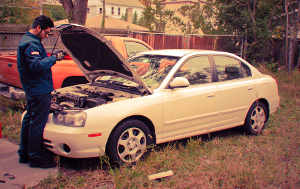The Ultimate Guide to Saving Money on Car Insurance

“This post may contain affiliate links, if you click a link we may earn a commission if you purchase from that merchant.”
Car insurance is a type of insurance that provides financial protection in the event of an accident or damage to your vehicle. It is a contract between you and an insurance company, where you pay a premium in exchange for coverage. Car insurance is important because it helps protect you from financial loss if you are involved in an accident or if your car is damaged or stolen.
In many countries, having car insurance is a legal requirement. This is because it helps ensure that drivers are financially responsible for any damage they may cause while driving. Without car insurance, you could be held personally liable for any damages or injuries you cause in an accident. Additionally, if you are caught driving without insurance, you may face fines, license suspension, or even jail time.
Key Takeaways
Car insurance is important to protect yourself and others on the road
Auto insurance rates are calculated based on various factors such as age, driving record, and location
There are different types of car insurance coverage, including liability, collision, and comprehensive
Filing a car insurance claim involves providing information about the accident and working with the insurance company to get reimbursed for damages
Discounts on car insurance premiums can be found by bundling policies, having a good driving record, and taking defensive driving courses
Understanding Auto Insurance Rates and How They Are Calculated
Auto insurance rates can vary greatly depending on a number of factors. Insurance companies take into account various factors when calculating rates, including your age, gender, driving record, credit score, and the type of car you drive.
Younger drivers and male drivers tend to have higher insurance rates because they are statistically more likely to be involved in accidents. Similarly, drivers with a poor driving record or a low credit score may also face higher rates because they are considered higher risk.
Insurance companies also consider the type of car you drive when calculating rates. Cars that are more expensive to repair or replace, or cars that are more likely to be stolen, will generally have higher insurance rates.
There are several ways to lower your auto insurance rates. One way is to maintain a clean driving record by avoiding accidents and traffic violations. Another way is to improve your credit score, as a higher credit score can result in lower insurance rates. Additionally, shopping around and comparing quotes from different insurance companies can help you find the best rate for your needs.
Different Types of Car Insurance Coverage and Which One to Choose
There are several different types of car insurance coverage, and it’s important to choose the right coverage for your needs. The most basic type of car insurance is liability coverage, which covers the cost of damages or injuries you cause to others in an accident. This is the minimum coverage required by law in many countries.
Collision coverage, on the other hand, covers the cost of repairs or replacement if your car is damaged in an accident. This coverage is optional, but it can be beneficial if you have a newer or more expensive car.
Comprehensive coverage provides protection against damage to your car that is not caused by a collision, such as theft, vandalism, or natural disasters. This coverage is also optional, but it can provide valuable peace of mind.
Personal injury protection (PIP) coverage is designed to cover medical expenses and lost wages for you and your passengers in the event of an accident. This coverage is required in some states and optional in others.
Uninsured/underinsured motorist coverage protects you if you are involved in an accident with a driver who does not have insurance or does not have enough insurance to cover the damages. This coverage is also optional but can be beneficial in case of an accident.
When choosing the right coverage for your needs, it’s important to consider factors such as the value of your car, your budget, and your risk tolerance. It may be helpful to consult with an insurance agent who can help guide you through the process.
How to File Car Insurance Claims and What to Expect
If you are involved in an accident or if your car is damaged or stolen, it’s important to know how to file a car insurance claim. The first step is to contact your insurance company as soon as possible after the incident occurs. They will guide you through the claims process and provide you with the necessary forms and information.
When filing a car insurance claim, it’s important to provide as much information as possible. This includes details about the accident or incident, any injuries or damages that occurred, and any other relevant information. You may also need to provide supporting documentation, such as police reports or medical records.
Once you have filed a claim, your insurance company will investigate the incident and determine the extent of the damages or injuries. They may request additional information or documentation during this process. Once the investigation is complete, your insurance company will either approve or deny your claim.
If your claim is approved, your insurance company will provide you with a settlement offer. This offer will outline the amount they are willing to pay for the damages or injuries. If you accept the offer, they will issue a payment to cover the costs. If you do not agree with the settlement offer, you may have the option to negotiate or appeal the decision.
It’s important to note that filing a car insurance claim can sometimes be a lengthy and complex process. It’s important to be patient and to follow up with your insurance company regularly to ensure that your claim is being processed in a timely manner.
Top Discounts to Look for When Shopping for Car Insurance
When shopping for car insurance, it’s important to look for discounts that can help lower your premium. Many insurance companies offer a variety of discounts that can help save you money on your policy.
One of the most common discounts is a good driver discount. This is typically offered to drivers who have a clean driving record and have not been involved in any accidents or received any traffic violations in a certain period of time.
Another common discount is a multi-car discount. This is offered to drivers who insure multiple vehicles with the same insurance company. Bundling discounts are also common and can be obtained by combining multiple policies, such as home and auto insurance, with the same company.
Students may be eligible for a student discount if they maintain good grades or complete a driver’s education course. Military personnel and veterans may also be eligible for discounts through certain insurance companies.
Other discounts to look for include discounts for safety features on your vehicle, such as anti-lock brakes or airbags, as well as discounts for paying your premium in full or setting up automatic payments.
It’s important to ask your insurance company about any available discounts and to provide them with any necessary documentation to qualify. Taking advantage of these discounts can help you save money on your car insurance premiums.
Tips for Saving Money on Car Insurance Premiums

In addition to taking advantage of available discounts, there are several other ways to save money on your car insurance premiums.
One way is to increase your deductible. The deductible is the amount you pay out of pocket before your insurance coverage kicks in. By increasing your deductible, you can lower your premium. However, it’s important to make sure you can afford to pay the higher deductible if you need to file a claim.
Improving your credit score can also help lower your car insurance premiums. Insurance companies often use credit scores as a factor when calculating rates, so maintaining a good credit score can result in lower premiums.
Driving a safe car can also help lower your insurance rates. Cars with safety features such as anti-lock brakes, airbags, and anti-theft devices are generally considered safer and may qualify for lower rates.
Avoiding accidents and traffic violations is another way to save money on car insurance. Insurance companies often offer lower rates to drivers with clean driving records. Additionally, some insurance companies offer accident forgiveness programs that prevent your rates from increasing after your first accident.
Finally, shopping around for the best rates is one of the most effective ways to save money on car insurance premiums. Different insurance companies have different rates and discounts, so it’s important to compare quotes from multiple companies before making a decision.
How to Handle Car Accidents and Minimize Their Impact on Your Insurance Rates
Car accidents can be stressful and overwhelming, but knowing what to do in the aftermath can help minimize their impact on your insurance rates.
The first step after a car accident is to ensure the safety of yourself and others involved. If anyone is injured, call for medical assistance immediately. If it is safe to do so, move your vehicle out of traffic to prevent further accidents or injuries.
Once everyone is safe, exchange information with the other driver(s) involved in the accident. This includes names, contact information, insurance information, and license plate numbers. It’s also a good idea to take photos of the accident scene and any damages or injuries.
After the accident, it’s important to report the incident to your insurance company as soon as possible. They will guide you through the claims process and provide you with the necessary forms and information. It’s important to provide accurate and detailed information about the accident when filing your claim.
It’s also important to note that accidents can have an impact on your insurance rates. Insurance companies consider accidents as a factor when calculating rates, and having an accident on your record can result in higher premiums. However, some insurance companies offer accident forgiveness programs that prevent your rates from increasing after your first accident.
To minimize the impact of accidents on your rates, it’s important to drive safely and avoid accidents whenever possible. Additionally, maintaining a clean driving record and taking advantage of any available discounts can help offset any potential rate increases.
Factors That Affect Your Car Insurance Rates and How to Improve Them
Several factors can affect your car insurance rates, and understanding these factors can help you improve your rates.
One factor that affects your car insurance rates is your age and gender. Younger drivers and male drivers tend to have higher insurance rates because they are statistically more likely to be involved in accidents. However, as you get older and gain more driving experience, your rates may decrease.
Your driving record is another important factor that affects your car insurance rates. Insurance companies consider your history of accidents and traffic violations when calculating rates. Maintaining a clean driving record by avoiding accidents and traffic violations can help improve your rates over time.
Your credit score can also affect your car insurance rates. Insurance companies often use credit scores as a factor when calculating rates, as studies have shown a correlation between credit scores and the likelihood of filing a claim. Improving your credit score by paying bills on time and reducing debt can help lower your insurance rates.
The type of car you drive can also affect your insurance rates. Cars that are more expensive to repair or replace, or cars that are more likely to be stolen, will generally have higher insurance rates. Additionally, cars with safety features such as anti-lock brakes and airbags may qualify for lower rates.
To improve your car insurance rates, it’s important to maintain a clean driving record, improve your credit score, and drive a safe car. Additionally, shopping around for the best rates and taking advantage of available discounts can help lower your premiums.
How to Compare Car Insurance Quotes and Choose the Best Policy
When shopping for car insurance, it’s important to compare quotes from different insurance companies to ensure you are getting the best policy for your needs.
To get car insurance quotes, you can start by contacting insurance companies directly or by using online comparison websites. These websites allow you to enter your information once and receive quotes from multiple companies.
When comparing quotes, it’s important to look beyond just the price. While price is an important factor, it’s also important to consider the coverage and customer service provided by each company.
When comparing policies, consider factors such as the coverage limits, deductibles, and exclusions. It’s important to choose a policy that provides adequate coverage for your needs and fits within your budget.
Additionally, consider the reputation and financial stability of each insurance company. You want to choose a company that has a good track record of customer service and that will be able to pay out claims in a timely manner.
It may also be helpful to read reviews or ask for recommendations from friends or family members who have had experience with different insurance companies.
Once you have compared quotes and policies, you can make an informed decision and choose the best policy for your needs. It’s important to review your policy regularly and make any necessary updates or changes as your needs change.
The Benefits of Being a Smart Shopper When It Comes to Car Insurance
Being a smart shopper when it comes to car insurance can have many benefits. By understanding your coverage and rates, you can ensure that you have the right amount of protection at a price that fits within your budget.
By shopping around and comparing quotes from different insurance companies, you can save money on your car insurance premiums. Taking advantage of available discounts and maintaining a clean driving record can also help lower your rates.
Understanding the claims process and knowing what to expect can help make the process smoother and less stressful if you are involved in an accident or if your car is damaged or stolen.
Overall, being a smart shopper when it comes to car insurance can help provide peace of mind knowing that you are protected in the event of an accident or damage to your vehicle. It’s important to review your coverage regularly and make any necessary updates or changes as your needs change.
If you’re looking to save money on car insurance, you might also be interested in our article on the best COVID-19 travel insurance plans. Travel insurance is an important consideration for anyone planning a trip during these uncertain times, and finding the right coverage at an affordable price is crucial. Check out our guide to discover the top options available and ensure you have the protection you need. Read more
FAQs
What is car insurance?
Car insurance is a type of insurance policy that provides financial protection against physical damage or bodily injury resulting from traffic collisions and against liability that could also arise from incidents in a vehicle.
Why is car insurance important?
Car insurance is important because it provides financial protection in case of an accident or theft. It can also help cover medical expenses and legal fees if you are found liable for an accident.
What factors affect car insurance rates?
Several factors can affect car insurance rates, including your driving record, age, gender, location, type of vehicle, and credit score.
What are some ways to save money on car insurance?
Some ways to save money on car insurance include shopping around for the best rates, raising your deductible, maintaining a good driving record, bundling policies, and taking advantage of discounts.
What types of car insurance coverage are available?
There are several types of car insurance coverage available, including liability coverage, collision coverage, comprehensive coverage, personal injury protection, and uninsured/underinsured motorist coverage.
What is liability coverage?
Liability coverage is a type of car insurance that covers damages and injuries you may cause to others in an accident. It typically includes bodily injury liability and property damage liability.
What is collision coverage?
Collision coverage is a type of car insurance that covers damages to your own vehicle in case of a collision with another vehicle or object.
What is comprehensive coverage?
Comprehensive coverage is a type of car insurance that covers damages to your vehicle caused by events such as theft, vandalism, or natural disasters.
What is personal injury protection?
Personal injury protection is a type of car insurance that covers medical expenses and lost wages for you and your passengers in case of an accident, regardless of who is at fault.
What is uninsured/underinsured motorist coverage?
Uninsured/underinsured motorist coverage is a type of car insurance that covers damages and injuries you may sustain in an accident caused by a driver who does not have enough insurance or no insurance at all.



